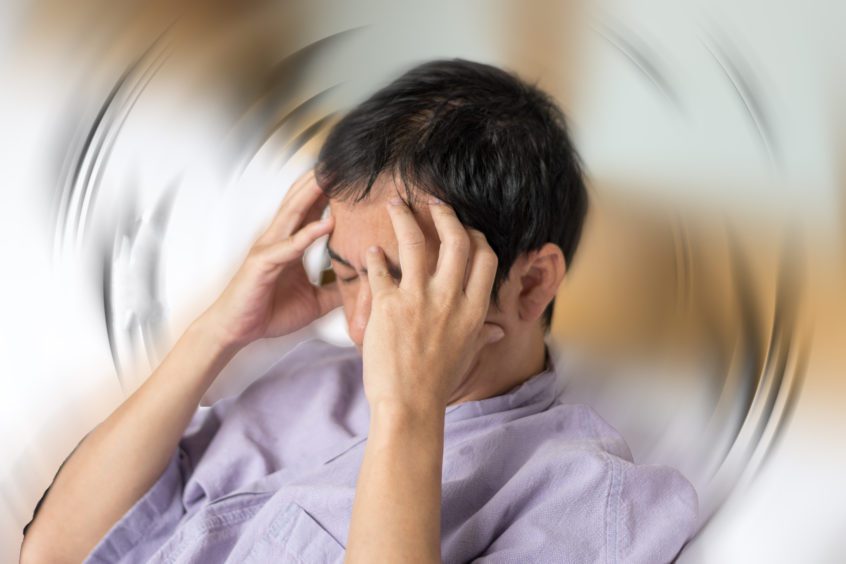Approximately one-third of those between 65 to 75 years of age report that dizziness and imbalance affect the quality of their lives. In fact, according to the Vestibular Disorders Association, dizziness is the number one malady for people older than 70.
Dizziness also leads to falls, the number one cause of injuries and deaths from injury among older Americans, according to the Centers for Disease Control.
But what’s behind this common and debilitating problem?
BPPV
There are lots of problems that can impact your balance, but one of the most common is called benign paroxysmal positional vertigo, or BPPV. BPPV is the most common cause of vertigo. BPPV will affect approximately 50 percent of individuals over 70 years of age at least once in their lives.
BPPV is caused by small calcium carbonate particles (otoconia), which are normally found in the inner ear. These particles can become displaced and migrate into one of the ear’s semicircular canals, where they do not belong. This condition is characterized by brief and intense episodes of vertigo that occur with a change in position. BPPV may be the result of the natural aging process, illness, a change in medication, or head trauma. Often, no known cause for BPPV can be identified.
Vestibular neuronitis/Neuritis
Vestibular neuronitis is the second leading cause of vertigo. This condition is typically characterized by a rapid-onset vertigo that is not accompanied by hearing loss. Patients may experience an intense spinning sensation with nausea and vomiting. These intense symptoms typically improve over the course of several days, with gradual improvement over the next few months. Vestibular neuronitis can occur as a single attack or multiple attacks. This condition is related to inflammation of the inner ear and may be related to a viral infection.
Loss of Balance or Unsteadiness
Issues affecting the equilibrium system of the inner ear can result in a feeling of unsteadiness, a loss of balance and/or falls. We use three primary systems to maintain our balance (i.e., vision, touch, and inner ear) and a disruption to any of these systems can result in imbalance. It is important for individuals who are off balance to be appropriately evaluated so the contribution of each system can be closely observed.
Migraine
When many individuals think of migraine, headache immediately comes to mind. It is important to understand that migraines can present with a number of different symptoms. One of these symptoms is related to the perception of dizziness or vertigo. Interestingly, research has shown that as many as 25 to 30 percent of individuals who suffer from migraines also experience vertigo as an aura. Many of those with vestibular migraines do not experience headaches at the same time as their dizziness.
Difficult to Diagnose
Not only do many different types of disorders cause dizziness, but the signs of these disorders are often hard to recognize. Complicating things is the fact that many people often have a hard time describing their symptoms.
Vertigo is the most specific symptom many people experience. Individuals may describe it as a feeling of movement which may be felt inside of the person, or the person may have the perception of movement of the environment around them. The movement may be perceived as spinning, up and down, or side-to-side dizziness, giddiness, floating, lightheadedness, or a less easily defined feeling.
In addition, disorders of the inner ear can be hard to distinguish from disorders that originate in the brain and nervous system. Approximately 80 percent of patients with vertigo have an inner ear disorder.
All these complexities make it important to be evaluated by a specialist in dizziness and balance disorders, such as Danielle Dorner, Au.D., Vestibular Audiologist with Associated Audiologists.
Dr. Dorner uses several sophisticated tests to evaluate balance problems. These tests include:
- Auditory Brainstem Response (ABR)
- Electro-oculography
- Video Head Impulse Test (vHIT)
- Rotary Chair
- Sensory Organization Performance (SOP)
- Electrocochleography (ECOG)
- Vestibular Evoked Myogenic Potential (VEMP)
- Video/Electro-nystagmography (VNG/ENG)
If you have experienced dizziness and balance problems, don’t wait until you fall to seek help. Dr. Dorner provides comprehensive care for our patients experiencing dizziness, vertigo and imbalance problems at our Overland Park Clinic. Schedule an appointment.



